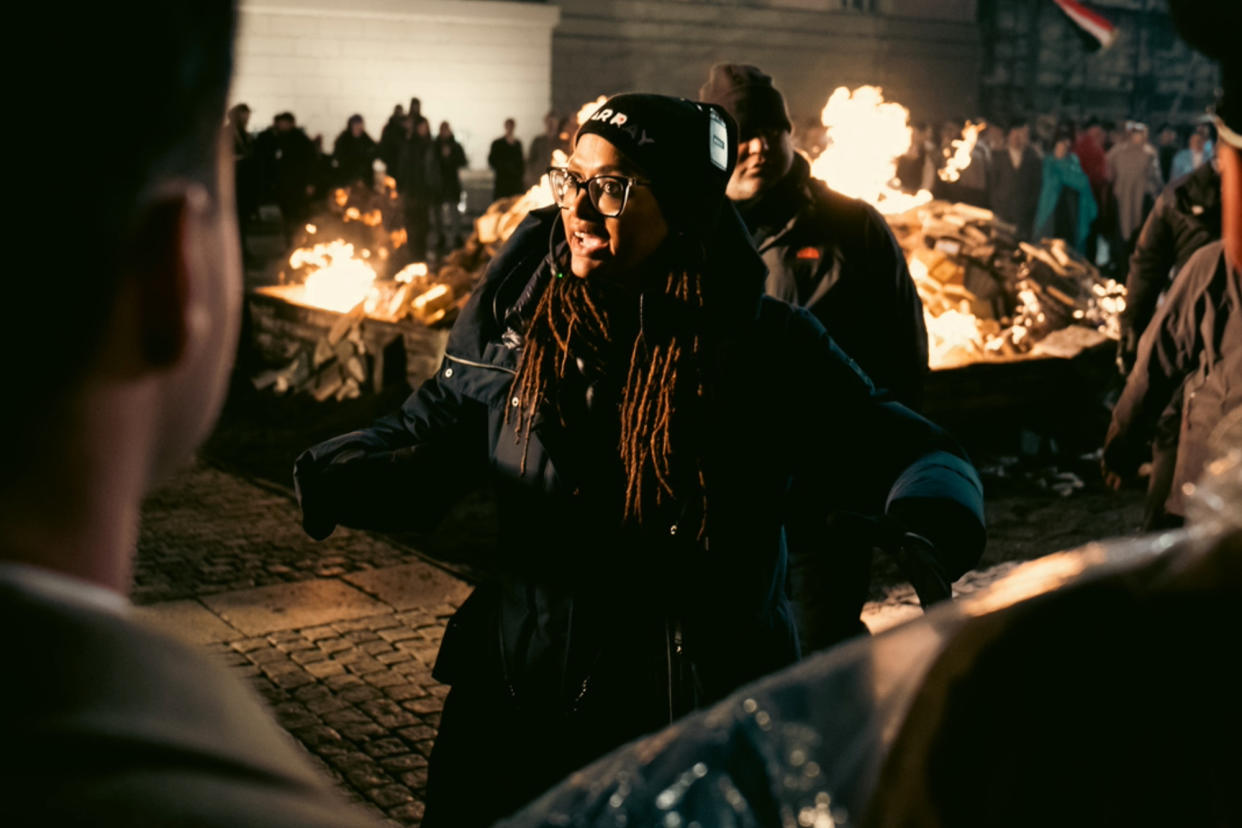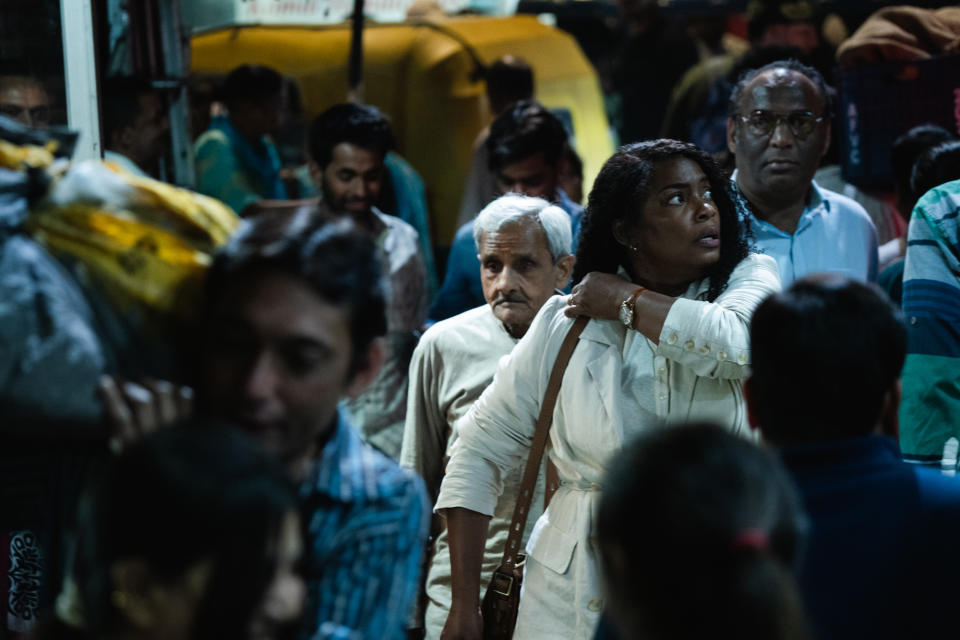Ava DuVernay’s Love of Background Actors Paid Off in ‘Origin’

There’s an aspect of filmmaking that Ava DuVernay thinks we don’t talk enough about and some of her fellow directors overlook to their own detriment.
“I spend a lot of time with background actors and feel like they are a beautiful brush stroke in the painting,” said DuVernay while a guest on IndieWire’s Toolkit podcast. “They’re treated so poorly, they make nothing, they have to stand around all day, they don’t know what they’re doing, they’re getting the worst food, they’re the last to be thought of. So [I found] if you give them a little bit of time, I’ve just gotten extraordinary results.”
More from IndieWire
Ethan Coen Teases Potential Coen Brothers Reunion: We're 'Working on Writing Something' Together
'Excision' (2012) Was the Midnight Sundance Showing That Sent Audiences Home with Bloody Tampons
With her new film “Origin,” DuVernay was particularly dependent on her extras. The film tracks the journey of author Isabel Wilkerson (Aunjanue Ellis-Taylor) researching and writing her best-selling nonfiction book, “Caste: The Origins of Our Discontents,” in which she uncovers a caste system underlying all of civilization and argues there is a common thread connecting oppression throughout modern history. In the book and film, direct parallels are made between the oppression of the lowest caste Dalits in India to the Holocaust to the United States’ history of racism (stretching from slavery to the murder of Trayvon Martin), requiring DuVernay to show large swaths of different societies and recreate historical moments, much of which was dependent on extras.
DuVernay points to a scene where 200 background performers portray Jews being herded to the concentration camps as an example of the value of spending time with extras. The director recalled walking into the staging area in Savannah, Georgia, where the local background actors were being costumed and aged for the scene they knew nothing about.
“A lot of times background actors don’t even know what’s happening in the scene. They don’t have the script. No one talks to them,” said DuVernay. “They’re treated like cattle.”
DuVernay started to explain the scene when one confused extra raised his hands to ask, “I’m Jewish?” The director then asked how many people in the room were Jewish. “There’s about 200 people in the room, five raise their hands. So that whole scene, you’re looking at people that did not have a lived experience or connection to [what we were filming].”
DuVernay spent the next hour prepping her background ensemble. She instructed them to forget being Jewish, but instead to remember a time when they had something that mattered taken from them. She also worked with them on creating a back story for their character, Were you a housewife? Were you a baker? A clerk? How many kids do you have? And to try to imagine their lives before this moment of irrevocable upheaval.
But it was her final direction to the group that she thinks made the biggest difference. “‘You are not extra. You are the core of the scene. There’s nothing extra here. There’s no main character. You are the main character,’” DuVernay recalled instructing them. “You [could] see the confidence rise.” And that hour she spent with the 200 performers paid off. “I called ‘Action,’ and they were there. The terror, the fear, the anguish, it’s on their faces…I cry just looking through the footage,” said DuVernay, who thinks the lesson from this is clear. “You have to spend time with the actors that you are asking to do anything.”
The director also saw how this approach paid off in totally unexpected ways on “Origin,” including one of the movie’s most heart-wrenching moments and a scene that enriches the film’s third act immeasurably. One of Wilkerson’s key, final breakthroughs –— in part because of the connection to her recently deceased mother Ruby Wilkerson (Emily Yancy) — is the discovery of the story of Al Bright (Lennox Simms), the only Black player on a championship Little League team in Ohio in the early 1950s. When the young boys are brought to the public pool for a swim after their victory, Bright is refused entrance and forced to watch his teammates from the other side of a chain link fence. Eventually, their coach convinces the lifeguard to allow Bright to float on an inflatable raft, but only after all the other boys get out of the water. Bright is sternly warned not to touch the water and is visibly terrified and tense as he floats. His white teammates watch in confused horror, in a moment that will clearly leave an indelible impression on all involved.

After DuVernay walked her background performers through the recreation of the pool scene, one of the background actors, an older white gentleman, Allan Wilayto, approached the director. “Ms. DuVernay, I had an experience similar to the scene we’re about to do,” he told the director, who asked Wilayto to tell her the story. What struck DuVernay was the emotion with which the older gentleman told the story and the deep regret he still carried decades later.
DuVernay recalled asking Wilayto, “‘Do you think if I give you the scene that we’re doing and you read it, that you can tell the story with the emotion you just told me [your] story?’” Wilayto informed her he had little acting experience, but went off to the side to read the scene where a witness to the incident tells Wilkerson about it. (Bright himself died months before Wilkerson discovered the story.)
Meanwhile, the director approached Ellis-Taylor, telling her lead, “‘Sit down, this guy’s going to tell a story. Let’s see [how] it goes.’” According to DuVernay, Wilayto returned and nailed the story in one take. “It was so heartwrenching, the story that he told. He took Aunjanue off guard… she was completely taken [in by] him, she cried in the scene.”
DuVernay reported that, consistently, the first question she gets after screenings is about the scene and Wilayto. And for her the lesson is clear: Collaboration goes beyond lead performers and department heads to include everyone who contributes to the making of a film.
Best of IndieWire
Sign up for Indiewire's Newsletter. For the latest news, follow us on Facebook, Twitter, and Instagram.

 Yahoo News
Yahoo News 
